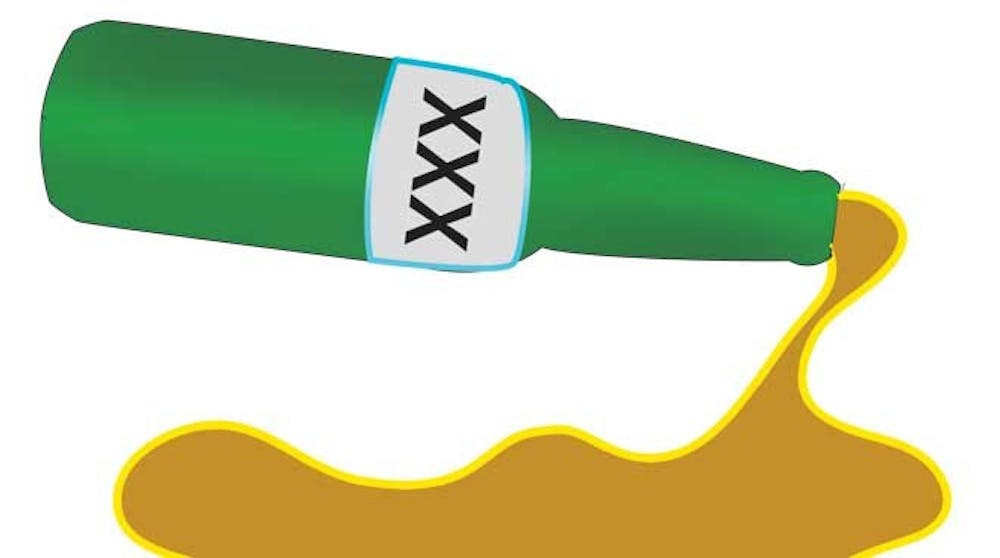The University of Richmond's Medical Assistance and Responsible Action Protocol protects students from getting in trouble for incurring or reporting alcohol-related illnesses.
Any student who receives emergency medical attention related to alcohol consumption will not be charged with a violation of the University Alcohol Policy provided the student meets with his or respective dean to discuss the incident and completes any required alcohol education policy prescribed by the dean's office, according to the policy.
Any student(s) who assists a student requiring medical attention related to alcohol consumption will not be charged with a violation of the University Alcohol Policy provided the student(s) are the first to contact emergency medical services, remain with the student in need of medical treatment and cooperate with emergency responders and meet with a university official for follow up, according to the policy.
Joe Boehman, Richmond College dean, said the policy had been formally enacted in Spring 2010 and printed in student handbooks in Fall 2010. The push to formalize the policy was led by members of UR Emergency Medical Services who recognized students were not reporting alcohol-related illnesses because of fear they would get in trouble, Boehman said.
"The policy as written now is the way our office has always acted in responding to those situations," Boehman said, "but it was never out there in the public. We worked with UREMS to solidify what the protocols were, put them in the handbook and publicize it.
"We want to tell our students that we want them to do the right thing and get the student help rather than be worried about potential consequences. We'd rather have somebody call in and get someone help than sit there and worry, 'Well if I call the police or call an RA and I've been drinking underage then I might get in trouble.'"
Senior Laura Zemcik, president of UREMS and advocate of the formalized policy, agreed it was important to assure students they could call for help to report student illnesses without getting in trouble.
"There should never be a decision of 'do I get punished for this or do I call and save my friend's life?'" Zemcik said.
Symptoms of an alcohol-related illness include confusion, vomiting, seizures, pale or blue skin, unconsciousness, low body temperature and slow and/or irregular breathing, according to a UREMS brochure.
If someone is believed to have an alcohol-related illness, students should call for help, remain with their friends, turn them on their side and do not give them anything to eat or drink, Zemcik said.
According to the UREMS Annual Report for 2010-2011, alcohol-related illness calls were second to accidental/sports-related injury calls. There were 40 alcohol-related illness calls, which composed 27 percent of the call volume, compared to 55 accidental/sports-related injury calls which composed 36 percent of call volume, according to the report.
UREMS has received eight alcohol-related illness calls for the fall 2011 semester as of Sept. 28.
Enjoy what you're reading?
Signup for our newsletter
Peter LeViness, director of CAPS, said it was important for students to drink in moderation and be able to recognize the signs of an alcohol problem.
An alcohol problem occurs when alcohol creates a problem in your life at work, home, school, in personal relationships, etc., LeViness said.
Last year, of 561 Counseling and Psychological Services clients, 38 women, or 10.8 percent of female clients, and 35 men, or 17.3 percent of male clients, sought services for issues related to alcohol, according to a CAPS client report.
For students who feel alcohol is causing a negative interference in their lives, CAPS is a good starting resource on campus to begin addressing those issues, LeViness said.
"They can start with us and it would depend of the severity," he said. "If it's at the point where they still have a chance at moderating their own drinking that's something we can help them with here. If it's above a certain severity level, we might want to get them to specialized services which would be off campus."
Contact staff writer Sarah Bowers at sarah.bowers@richmond.edu
Support independent student media
You can make a tax-deductible donation by clicking the button below, which takes you to our secure PayPal account. The page is set up to receive contributions in whatever amount you designate. We look forward to using the money we raise to further our mission of providing honest and accurate information to students, faculty, staff, alumni and others in the general public.
Donate Now



